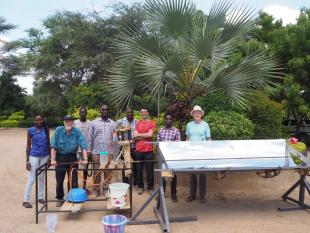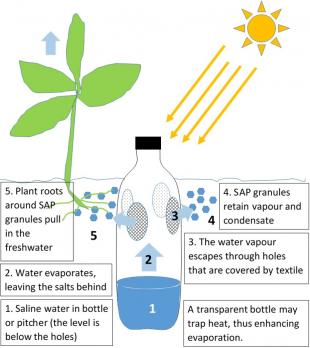In November 2017, a consortium of parners led by Dr Dimitri Mignard at the University of Edinburgh and by Prof. Izael Da Silva and Ms Sarah Odera at the Strathmore Energy Research Centre were awarded an Institutional Links grant, ID 332448433, under the Newton-Utafiti partnership.
The project's aim was simply stated by its title, “Enhanced food security and afforestation through novel approaches to irrigation”.
Partners included theTurkana station of Kenya Forestry Research Organisation (KEFRI, represented by researchers Jesse Owino and Jackie Kemboi), as well as Kenya Agricultural and Livestock Research Organisation (KALRO, represented by Fabian Kaburu) and Kenya Water Institute (KEWI, represented by Teresia Mucia). Other researchers involved included Patrick Mwanzia (SERC) and Karl Mikl (SERC).
The starting point for this project was the observation that farming, livestock and afforestation in many parts of Kenya depend on water from boreholes that is often saline. While the salt concentration of this water may be one order of magnitude lower than that found in sea water (in which case the water is referred to as ‘brackish water’), this salinity is still a serious issue not just for human health through direct consumption of water, but also for animal health and plant growth. Saline water reduces the yield and plant quality of many crops including maize, a staple diet in Kenya, and irrigation with saline water also degrades the quality of the soil overtime (‘soil salinization’).
Our research therefore focused on developing improved or novel irrigation methods that feed low salinity water to crops and tree saplings, with the aim of enhancing food security and afforestation in Kenya and other similar regions of the world.
The project achieved the following:
1. Construction and testing in Kenya of a low cost solar thermal desalinator that can be locally built, thus allowing not just generation of water but also creation of economic activities. A summary report may be found here.
2. A survey of users of Reverse Osmosis (RO) for water desalination. An RO was recommissioned at the KEWI headquarters in Nairobi (providing a service to its staff and students by removing the fluoride from the local borehole water), and used for training at KEWI. A handbook and the basic material for training modules were produced, which will now help SERC and KEWI with developing training programmes for users wishing to select, plan, install and maintain their desalination or defluoridation plants.
3. Field trials for "in soil" integrated desalination and irrigation for growing crops and trees in the arid Turkana County, with a combination of different techniques, some of these novel. The concept of using vapour-fed irrigation preventing soil salinization seem to have been validated in field trials in Turkana. The survival rates and growth of saplings of slow growing species (such as Guava, Mango and native Acacias) was comparable to taht with direct watering, and if also adding SuperAbsorbents to the soil it was possible to grow sorghum. A summary report may be found here.
4. A week-long training week on desalination and irrigation in Edinburgh to expose young Kenyan researchers to world class research and networks; training for local technical college in Lodwar on solar thermal desalination; a workshop in Nairobi and one in Lodwar (Turkana) for sharing expertise and results, and engaging with stakeholders.





